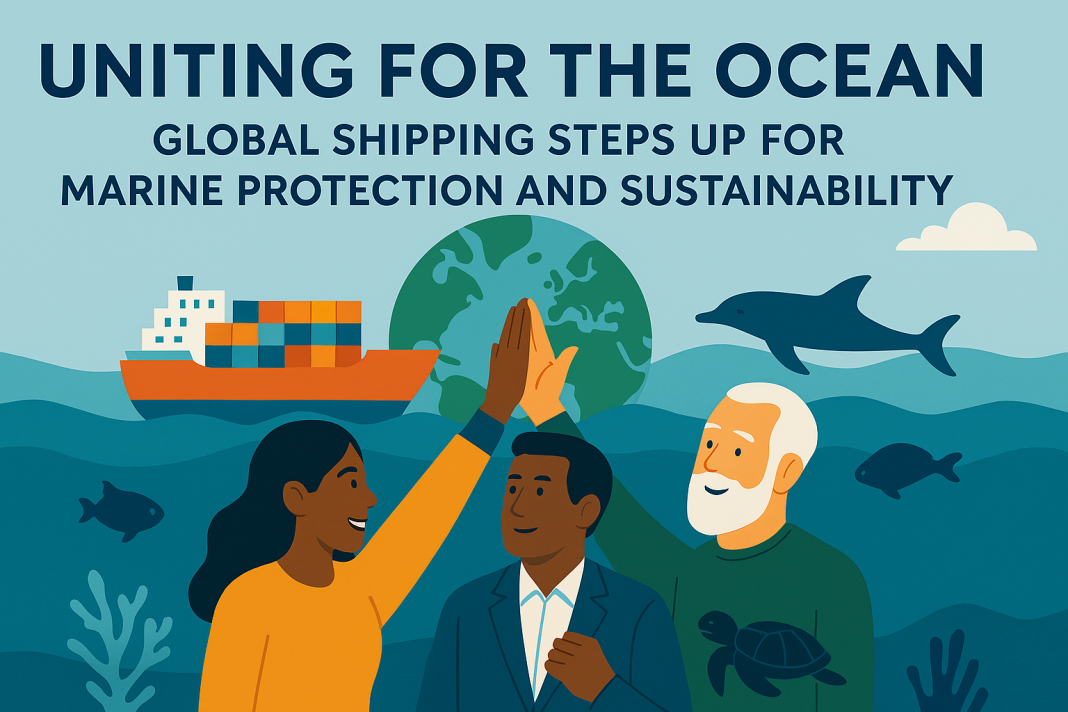Egyre hangosabbak a hangok az óceán védelmében
A tengereinket érő, éghajlatváltozás, szennyezés és a biológiai sokféleség csökkenése által táplált növekvő fenyegetések a nemzetközi közösség kollektív válaszát váltották ki. E kezdeményezés központi eleme a tengeri szállítási ágazat, amely kulcsfontosságú szerepet játszik a globális kereskedelemben, és jelentős hatást gyakorol a tengeri környezetre. Tekintettel arra, hogy a globális kereskedelem több mint 80%-át hajókkal bonyolítják le, az ágazat évente elképesztő összeget termel az óceáni gazdaság számára, ami alátámasztja a fenntartható gyakorlatok iránti igényt. A közelmúltbeli nemzetközi megállapodások és konferenciák, például a harmadik ENSZ Óceán Konferencia által generált lendület elősegítette a globális vezetők és a hajózási ágazat érdekelt felei közötti együttműködést e sürgető kihívások kezelése érdekében.
A közös fellépés fontossága
A Világ Óceánok Napjának közeledtével a tengeri élővilág megőrzésére irányuló összehangolt erőfeszítésekre szólítottak fel olyan vezetők, mint az IMO főtitkára, Arsenio Dominguez. Kiemelte a tengeri ökoszisztémák védelmének közös felelősségét, hangsúlyozva, hogy ez nem csupán kötelesség, hanem lehetőség is arra, hogy felülvizsgáljuk és javítsuk az óceánhoz fűződő kapcsolatunkat.
“Ez a mi óceánunk; ez a mi kötelességünk és lehetőségünk” – jelentette ki Dominguez. “Ahogy ünnepeljük az Óceánok Világnapját, erősítsük meg elkötelezettségünket a fokozott agrár cselekvés iránt, melynek célja óceánjaink védelme.” A közelmúltban a franciaországi Nizzában megrendezett UNOC3-on Dominguez megbeszéléseket vezetett különböző ágazatok befolyásos személyiségeivel, összehangolva az erőfeszítéseket annak érdekében, hogy a hajózás kiemelkedő helyet kapjon a tengeri élővilág megőrzésének történetében.
A hajózás kulcsfontosságú szerepe a tengeri kormányzásban
Az UNOC3 eredményei fordulópontot jelentettek, rávilágítva a hajózás kritikus szerepére az óceánok átfogó kormányzásában. A megvitatott jelentős megállapodások között szerepelt a Kunming-Montreal Globális Biodiverzitás Keretrendszer, amelynek célja a biodiverzitás csökkenésének visszafordítása 2030-ig, valamint a Nyílt Tengeri Szerződés (“BBNJ Megállapodás”), amelyet a nemzeti joghatóságokon kívüli tengeri biodiverzitás kezelésére hoztak létre.
A konferencián folytatott megbeszélések a tengerészeti ágazat ökológiai lábnyomára összpontosítottak, olyan kérdésekkel foglalkozva, mint a tengeri hulladék, a műanyagszennyezés és a hajózási tevékenységekből származó üvegházhatású gázok kibocsátása. A várható új szabályozási kereteket, különösen a Nyílt Tengeri Szerződés keretében, bemutatták vagy finomították, utat nyitva a jövőbeli kezdeményezések előtt, mint például a sérülékeny tengeri területek védelme, beleértve a Costa Rica-i Hőkupolát, valamint a bálnák védelmének megerősítése.
Szükséges transzformatív intézkedések
Évtizedekre visszatekintő tengerészeti környezetvédelmi szabályozásra építve az IMO felerősíti kezdeményezéseit az éghajlatváltozás, a szennyezés és a csökkenő biodiverzitás sürgető válságainak leküzdésére. Megközelítésük a következőket foglalja magában:
- Éghajlatváltozás elleni küzdelem: Új szabályozások kidolgozása az üvegházhatású gázok kibocsátásának visszaszorítására és a dekarbonizációs technológiák támogatása.
- A szennyezés megelőzése: Globális cselekvési stratégiák frissítése a tengeri műanyagszemét problémájának kezelésére.
- A biodiverzitás megőrzése: Jogi kötőerővel bíró intézkedések bevezetése az invazív vízi fajok terjedésének korlátozására és a víz alatti zaj minimalizálására.
Az ENSZ UNOC3 konferenciáján újonnan létrejött két globális iparági szövetség is jól mutatja a kollektív fejlődés felé irányuló törekvést, a tengeri műanyagszennyezésre és a víz alatti zaj csökkentésére összpontosítva, áthidalva a szakadékot a kormányok és a magánpartnerek között a szennyezés elleni egységes frontban.
Innovatív Kezdeményezések Formálódnak
A konferencián született mérföldkőnek számító javaslat a Csendes Óceánért Létrehozott Magas Ambíciójú Koalíció volt, melynek élén Kanada és Panama állt. Ez a kezdeményezés 35 nemzetet egyesít a tengeri ökoszisztémákra káros víz alatti zajszennyezés csökkentésére irányuló erőfeszítésekben. A koalíció keretrendszere stratégiai célokat fogalmaz meg:
- A csendesebb hajótervek népszerűsítése az IMO szabványain keresztül
- Építse be a zajcsökkentési stratégiákat a tengeri védett területekkel kapcsolatos megfontolásokba
- Gyakorlati intézkedések bevezetése a hajók zajszintjének csökkentésére
- A kapacitásépítés erősítése olyan együttműködési kezdeményezéseken keresztül, mint az IMO GloNoise Partnership programja
Dr. Bev Mackenzie a BIMCO-tól hangsúlyozta a kezdeményezés jelentőségét, megjegyezve, hogy a hajótervezés és az üzemeltetési protokollok terén elért fejlesztések csökkent környezeti lábnyomhoz és javuló hatékonysághoz vezethetnek.
Adatok hasznosítása 10 000 hajón keresztül az óceánért
Az egyik leginnovatívabb kezdeményezés a “10 000 Hajó az Óceánért” projekt volt, amely az IMO, a Meteorológiai Világszervezet és a Nemzetközi Hidrográfiai Szervezet együttműködése. Ez a program arra törekszik, hogy a kereskedelmi hajókat adatgyűjtő platformokká alakítsa, amelyek valós időben rögzítik a kritikus oceanográfiai és meteorológiai információkat. Ez nemcsak javítja az időjárás-előrejelzési képességeket és korai figyelmeztető rendszereket biztosít, hanem a tengerészeti ipar számára is pontosabb klímamodellezést ígér.
“A jogi és technikai korlátok együttműködéssel történő leküzdése jelentős adatelőnyöket eredményez,” jegyezték meg a BIMCO képviselői, sürgetve a tagvállalatokat, hogy vegyenek részt ebben a kezdeményezésben és segítsenek megszüntetni a lényeges adathiányokat.
A Továbbvezető Út: Lendület a 2028-as és az azon túli évekre
Bár az ENSZ Óceán Konferencia 3. nem vezetett jogilag kötelező érvényű határozatokhoz, egy erőteljes nyilatkozattal megszilárdította a globális kötelezettségvállalásokat, amely sürgeti a megőrzést és a fenntartható óceánhasználatot. Ahogy a Nyílt Tengeri Szerződés a ratifikálás felé halad, várhatóan 2026-ban tartják az első Szerződő Felek Konferenciáját, a globális érdekelt feleket arra ösztönzik, hogy tartsák fenn ezt a lendületet.
Dominguez szívhez szóló emlékeztetője továbbra is érvényes: “Óceánjaink egészsége bolygónk egészségével rezonál. Tartsuk fenn a kollektív fellépés iránti elkötelezettségünket, és törekedjünk kézzelfogható eredményekre a következő, 2028-as ENSZ Óceánkonferenciáig.”
Következtetés
A tengerészeti ipar kritikus ponthoz érkezett az óceánok egészsége és a fenntarthatóság tekintetében. A legutóbbi nemzetközi fórumokon tanúsított együttműködési szellem tükrözi a tengeri környezetünk védelmére irányuló folyamatos erőfeszítések iránti határozott elkötelezettséget. Bár a felülvizsgálatok és visszajelzések rávilágítanak a cselekvés szükségességére, semmi sem helyettesíti a közvetlen részvételt ezekben az átalakító projektekben. A GetTransport.com oldalon a felhasználók költséghatékony megoldásokat találhatnak globális áruszállítási igényeikre, biztosítva az átlátható és megbízható logisztikát, az irodaköltöztetéstől a nemzetközi szállításig. Legyen szó nagyméretű bútorokról vagy áruk országhatárokon át történő szállításáról, a platform széles kínálata biztosítja a hozzáférhető szolgáltatást versenyképes áron. Az egyszerűséget és a hatékonyságot hangsúlyozva a GetTransport.com készen áll a szállítási igények széles skálájának kielégítésére – legyen szó helyi házköltöztetésről vagy nemzetközi áruszállításról. Foglalja le utazását a következő címen: GetTransport.com még ma, és tapasztalja meg a különbséget!

 A tengerészeti ágazat összefog az ökológiailag fenntartható óceáni gyakorlatok és a fenntarthatóság érdekében">
A tengerészeti ágazat összefog az ökológiailag fenntartható óceáni gyakorlatok és a fenntarthatóság érdekében">